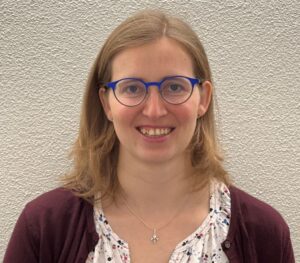Posted By: HGG Advances
Each month, the editors of Human Genetics and Genomics Advances interview an early-career researcher who has published work in the journal. This month, we check in with Anne Gregor, PhD to discuss her paper “Proteasomal activation ameliorates neuronal phenotypes linked to FBXO11-deficiency.”

HGGA: What motivated you to start working on this project?
Anne Gregor (AG): I first became interested in FBXO11, when we and others could link variants in this gene to a variable neurodevelopmental disorder (NDD). As not much was known about neuronal functions of the ubiquitin ligase complex protein FBXO11 and as impairment of the ubiquitin proteasome system (UPS) was a newly emerging theme among NDD-related genes, we wanted to get a better understanding of the gene itself and the role of the UPS in NDDs.
HGGA: What about this paper/project most excites you?
AG: We had this naïve idea that activation of the proteasome might help with some of the phenotypes associated with FBXO11-related disorder that may be linked to impaired ubiquitination and degradation. And to see this actually work in vitro and in vivo was really cool. And what is most exciting is that one of the activators is a long-approved drug, so drug repurposing could be a feasible therapeutic approach in the future for FBXO11-related NDDs.
HGGA: What do you hope the impact of this work will be for the human genetics community?
AG: In the future I hope that we can come up with more options of drug repurposing for rare disorders; and with this possibly provide therapeutic options for many families, even though this hope still has a long way to go.
HGGA: What are some of the biggest challenges you’ve faced as a young scientist?
AG: One of the challenges for me was/is to find the right career niche to work on something that really excites me and at the same time also acquire the necessary funding to pursue my own ideas as a young scientist. Luckily, working in a supportive environment makes those challenges a bit more manageable.
HGGA: And for fun, what is one of the most fascinating things in genetics you’ve learned about in the past year or so?
AG: What is really fascinating to me is how the number of genetic therapies (gene therapy, ASO-treatment, CRISPR-based therapies) are slowly growing and how some forms of treatment might be available for even more rare disorders where this was almost unimaginable maybe ten years ago.
Anne Gregor, PhD is Senior scientist at the University of Bern in the Department for BioMedical Research at and the Department of Human Genetics, Inselspital University Hospital Bern.
